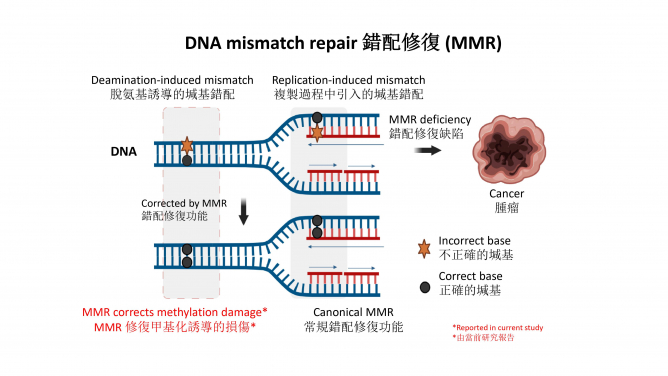Media
HKUMed discovers an unknown function of DNA mismatch repair
that protects us from cancer
09 Feb 2022
Researchers at the School of Biomedical Sciences, LKS Faculty of Medicine of The University of Hong Kong (HKUMed) discovered an unknown role of DNA mismatch repair (MMR) in maintaining the integrity of the human genome. People born with defective MMR, known as Lynch syndrome, will have a high chance of developing cancer by early adulthood. The research, now published in Science Advances, highlighted why MMR is so important in protecting us from developing cancer (link to publication).
Background
MMR is well known for its role in protecting DNA from accumulating mutations during cell division. However, the ability to sequence the cancer genome of patients with MMR deficiency (MMRd) has provided hints that the function of MMR might be more complex than previously thought.
Research methods and findings
In this study, the research team used somatic mutation data from hundreds of MMRd cancer patients across multiple cohorts, including The Cancer Genome Atlas, Clinical Proteomic Tumor Analysis Consortium and AACR Project GENIE to resolve the key mutational processes associated with the loss of specific components of MMR, namely, MutSα (MSH2/MSH6) and MutLα (MLH1/PMS2). Cancers with deficiency of MutSα were found to have significant differences in mutational signatures compared with those with MutLα deficiency.
The research team further investigated the mechanism underlying these signatures by integrating epigenetic data and somatic mutations from cancers with specific defects in non-replication and replication-associated DNA repair respectively. Through this analysis, researchers discovered that the MutSα component of MMR is essential in repairing 5-methylcytosine deamination, a very common form of non-replication associated DNA damage that occurs hundreds of times in each of our cells every day.
Significance of the study
‘Our findings revealed a previously unknown role of mismatch repair that is essential in protecting the human genome from damage induced by 5-methylcytosine deamination,’ said Dr Jason Wong Wing-hon, Associate Professor of the School of Biomedical Sciences, HKUMed, who initiated the study. ‘This challenges a widely held assumption that the main role of MMR is in the repair of errors in DNA that occur during replication. Resolving this key mutational process in MMRd cancers provides a better understanding of why patients with MMRd develop cancer so easily. The study demonstrates that the consequence of MMRd is dependent on the specific defective component and will help resolve how each MMRd cancer evolves.’
About the research team
The study was conducted by Dr Jason Wong Wing-hon, Associate Professor of the School of Biomedical Sciences, HKUMed; with the assistance from Dr Fang Hu, Research Assistant, Mr Zhu Xiaoqiang and Mr Yang Haocheng, PhD students; Ms Oh Jieun, BSc(Biochem) graduate, and Dr Jayne A. Barbour, Post-doctoral Fellow, School of Biomedical Sciences, HKUMed.
Acknowledgements
The project was supported by the Hong Kong Research Grants Council (GRF:17100920 and CRF:C7028-19G) and Seed Funding from the University Research Committee,The University of Hong Kong.
Media enquiries
Please contact LKS Faculty of Medicine of The University of Hong Kong by email (medmedia@hku.hk).

